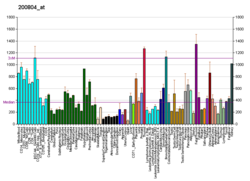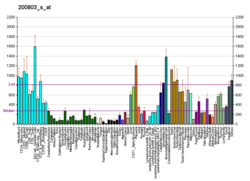| TMBIM6 |
|---|
|
| Identifiers |
|---|
| Aliases | TMBIM6, BAXI1, BI-1, TEGT, transmembrane BAX inhibitor motif containing 6 |
|---|
| External IDs | OMIM: 600748; MGI: 99682; HomoloGene: 2419; GeneCards: TMBIM6; OMA:TMBIM6 - orthologs |
|---|
| Gene location (Human) |
|---|
 | | Chr. | Chromosome 12 (human)[1] |
|---|
| | Band | 12q13.12 | Start | 49,707,725 bp[1] |
|---|
| End | 49,764,934 bp[1] |
|---|
|
| Gene location (Mouse) |
|---|
 | | Chr. | Chromosome 15 (mouse)[2] |
|---|
| | Band | 15 F1|15 56.13 cM | Start | 99,290,763 bp[2] |
|---|
| End | 99,307,930 bp[2] |
|---|
|
| RNA expression pattern |
|---|
| Bgee | | Human | Mouse (ortholog) |
|---|
| Top expressed in | - islet of Langerhans
- renal medulla
- parotid gland
- right testis
- left testis
- ventricular zone
- gallbladder
- mucosa of ileum
- rectum
- right adrenal cortex
|
| | Top expressed in | - lacrimal gland
- vestibular membrane of cochlear duct
- human kidney
- submandibular gland
- olfactory epithelium
- granulocyte
- epithelium of stomach
- parotid gland
- jejunum
- intestinal villus
|
| | More reference expression data |
|
|---|
| BioGPS | 
 | | More reference expression data |
|
|---|
|
| Gene ontology |
|---|
| Molecular function | - endoribonuclease inhibitor activity
- protein binding
- enzyme binding
- ubiquitin protein ligase binding
| | Cellular component | - cytoplasm
- integral component of membrane
- endoplasmic reticulum membrane
- membrane
- mitochondrial membranes
- integral component of plasma membrane
- endoplasmic reticulum
- nucleus
| | Biological process | - negative regulation of endoplasmic reticulum stress-induced intrinsic apoptotic signaling pathway
- negative regulation of endoribonuclease activity
- negative regulation of apoptotic signaling pathway
- negative regulation of apoptotic process
- negative regulation of protein binding
- endoplasmic reticulum calcium ion homeostasis
- response to endoplasmic reticulum stress
- autophagy
- response to unfolded protein
- intrinsic apoptotic signaling pathway in response to endoplasmic reticulum stress
- response to L-glutamate
- negative regulation of transcription from RNA polymerase II promoter in response to endoplasmic reticulum stress
- negative regulation of hypoxia-induced intrinsic apoptotic signaling pathway
- apoptotic process
- negative regulation of calcium ion transport into cytosol
- negative regulation of RNA splicing
- Unfolded Protein Response
| | Sources:Amigo / QuickGO |
|
| Orthologs |
|---|
| Species | Human | Mouse |
|---|
| Entrez | | |
|---|
| Ensembl | | |
|---|
| UniProt | | |
|---|
| RefSeq (mRNA) | | |
|---|
NM_001171034
NM_001171035
NM_001171036
NM_026669 |
|
|---|
| RefSeq (protein) | | |
|---|
NP_001164505
NP_001164506
NP_001164507
NP_080945 |
|
|---|
| Location (UCSC) | Chr 12: 49.71 – 49.76 Mb | Chr 15: 99.29 – 99.31 Mb |
|---|
| PubMed search | [3] | [4] |
|---|
|
| Wikidata |
| View/Edit Human | View/Edit Mouse |
|



















